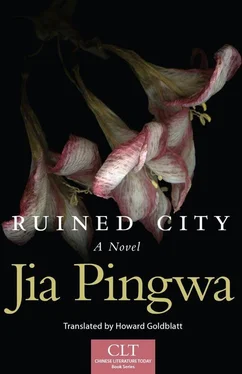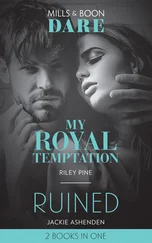“This time maybe it’ll work,” she said. “Say something. Tell me some stories, stories about real people and real events.”
“How many stories do you think I have? If it works, it works; if not, that’s because a great man comes by only once in a lifetime.”
“You’re known in Xijing, but Wang Ximian’s fame is greater than yours, so how has he managed three sons, not to mention a rumored five-year-old out of wedlock?”
“If you didn’t watch me so closely, I might have one of those,” Zhuang said.
She had no response to that when, without warning, Zhuang had an erection. “Let’s do it,” he said.
“Not yet,” she said. “Take it easy.”
He went limp, and Yueqing pushed him off. “You’ve always got other women on your mind. Would you like to tell me how you expect to have a child out of wedlock?”
Zhuang was deflated; Yueqing was unsatisfied. She told him to bring her to orgasm with his hand, after which they rolled over and went to sleep. Not another word was spoken that night.
The next day, a tearful Niu Yueqing asked Zhuang to accompany her to her cousin’s house with the patent medicine. He refused, so she stormed out of the house alone. He sat there awhile, until boredom set in, then got up to visit the 101 Pesticide Plant in the suburbs to gather material for the article he had promised to write. He got a bare bones tour, beginning with the owner telling him all about himself and ending with a quick look at the workshops. He knocked the article out that evening, and after he delivered the manuscript to the newspaper office, he experienced an urge to call on Tang Wan’er.
Zhuang had an attack of nerves when he reached the intersection in front of the Clear Void Nunnery. He didn’t know whether Zhou Min was home, and even if he wasn’t, the big question was how the man’s wife would react to his visit. His talk with Ruan Zhifei that night had boosted his courage, but his experience with Jing Xueyin had eroded that courage. And besides, his impotence with Niu Yueqing in their marriage bed was deeply troubling — he was feeling less and less like a man. Yet just thinking about Tang Wan’er had the opposite effect, and he had to wonder what there was between him and the woman. The more he thought, the more confused he felt. He wavered for a while before finally entering a neighborhood diner, where he ordered a beer and a plate of smoked intestines. He drank alone. The bar occupied a space of twenty square meters or less, with unpainted dark brick walls. The countertop, made of heavy white wood, was lined with vats of alcohol, their openings covered with red cloth. Strangely, an old-fashioned wooden plow hung on the wall behind the bar, lending the place a rustic air. It was one of Zhuang’s favorite places; it had a calming effect on him and often made him think back to his childhood in Tongguan. There weren’t many customers that day. The first to come in after him were some peddlers who left their stands outside, keeping an eye on them while they chatted with the owner and sipped a glass of the strong stuff, making it last as long as possible. Then an old fellow stumbled in the door and stood wordlessly at the bar. The owner filled a glass from one of the vats. The man tipped his head back and drained it, then took some money out of his pocket, glared at the owner, and said, “Diluted it, didn’t you?”
“Are you trying to put me out of business?” the owner complained. “If you do, who will wait on you three times a day?”
The man smiled and walked out. Quiet returned to the bar, with Zhuang Zhidie and an old man in the corner the only customers. The other man was wrinkled and gray, but his eyes were full of life. He was washing down a plate of salted soybeans with strong liquor. The way he held his glass between his thumb and two fingers told Zhuang that he was a cultured man. Zhuang frequently encountered old professors or veteran scholars from the research institutes in bars like this. They dressed simply and were quite convivial. Drunk young ne’er-do-wells were contemptuous of these men, mistaking them for retired laborers or mid-level government employees who had retired from active duty; angry that the older men were taking up their stools, the younger ones nudged them out of the way as they lined up to buy snacks to go with their drinks. Zhuang didn’t recognize this particular old gent, but he was sure he was a man of wide experience and knowledge. He watched him as he drank, wishing the old fellow would look up and meet his gaze, but at the same time fearful that when he did, he would turn out to be one of those gifted individuals who could see deep inside you, someone to whom you might as well be transparent. But the man was oblivious to his surroundings as he picked up a bean and popped it into his mouth. He chewed for a moment, then picked up his glass and took a sip, enjoying the moment. Zhuang felt that he was wearing himself out, living a worthless, even base, existence. Strains of exquisite music drifted in on the air, getting louder. The bar owner ran to the door to see where it was coming from. Zhuang followed him. A procession of family members was coming up the lane to receive a relative’s ashes from the crematorium. At the head of the lane, musicians were leading a dozen or so bereaved sons and grandsons who would accept the urn and perform the rites before turning to home, accompanied by music. Zhuang had witnessed a great many funerals, but he was moved by this music — properly funereal, yet relaxed, soft on the ear, quickly surging through his veins into all his joints, releasing his fatigue and melancholy and turning it into a long sigh. “What’s that tune they’re playing?” Zhuang asked the bar owner.
“It’s an elegy adapted from a crying aria in a Qin opera,” the owner replied.
“It’s truly beautiful,” Zhuang said, startling the bar owner, whose eyes expressed surprise.
“You’re a strange one,” he said, “finding a funeral melody beautiful. Even if it is, you can’t play it at home. It’s not just another popular song.”
Zhuang let the comment pass as he returned to his table. A youngster with white-rimmed glasses had replaced the old man at the other end of the table. He was engrossed in a magazine, laughing softly from time to time. These days it was rare to see someone who could be so easily captivated by a world in letters, a thought that led Zhuang to muse that every essay in the world emerges from the pen of a writer and can play on readers’ emotions. Knowing how he wrote his essays, his wife didn’t think much of them. But other people’s books could have her awash in tears.
The man smacked his lips, and Zhuang thought that one of the characters in what he was reading must be enjoying some good food. He let go of the magazine with one hand, picked up a pair of chopsticks, and plucked three pieces of smoked sausage off of Zhuang’s plate, putting them into the mouth behind the magazine. A moment later the chopsticks reached out again to pick up two more pieces, so amusing and annoying Zhuang that he banged his own chopsticks against the table. The startled young man put down his magazine, and with an “Oh!” he spat the sausage onto the floor.
“Sorry. I’m so sorry. I ate from the wrong plate.”
Zhuang laughed.
“What are you reading that has you so absorbed?” he asked.
“You wouldn’t know, but this is about Zhuang Zhidie. Do you know who he is? I’ve read his works in the past but had no idea he’s just like us.”
“Is that so?” Zhuang said. “What does it say?”
“It says that Zhuang was a foolish child. In elementary school he thought teachers were the greatest people in the world. Then one day he went to the toilet and saw his teacher urinating. It was an eye-opener. ‘Even teachers need to pee!’ he said, as if they never needed to relieve themselves. Naturally his teacher glared at him, but didn’t say a word, while Zhuang looked on and wondered out loud, ‘Do teachers have to shake it, too?’ Complaining that the boy had a low sense of morality, the teacher reported this to his father, who gave him a good beating.”
Читать дальше


![Matthew Vincent - [you] Ruined It for Everyone!](/books/216429/matthew-vincent-you-ruined-it-for-everyone-thumb.webp)









